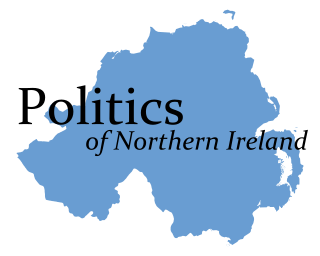
The Social Democratic and Labour Party (SDLP) is a social-democratic and Irish nationalist political party in Northern Ireland. The SDLP currently has 12 MLAs in the Northern Ireland Assembly. It has no elected representatives in the House of Commons of the United Kingdom having lost its three remaining Parliamentary seats in the 2017 general election.

Northern Ireland is one of the four countries of the United Kingdom, situated in the northeast of the island of Ireland. It was created as a separate legal entity on 3 May 1921, under the Government of Ireland Act 1920. The new autonomous Northern Ireland was formed from six of the nine counties of Ulster: four counties with unionist majorities and two counties, Fermanagh and Tyrone, which had slight Irish nationalist majorities. The remaining three Ulster counties with larger nationalist majorities were not included. In large part unionists, at least in the northeast, supported its creation while nationalists were opposed.

Fermanagh District Council was a local council in Northern Ireland. It merged with Omagh District Council in April 2015 under local government reorganisation to become Fermanagh and Omagh District Council.

Belfast North is a parliamentary constituency in the United Kingdom House of Commons.

Belfast West is a parliamentary constituency (seat) in the House of Commons of the UK Parliament. It has won by Paul Maskey of Sinn Féin since 2011. In 2017 it ranked the most secure of Northern Ireland's 18 seats by percentage and/or numerical tally of its winning majority, followed by North Down and by North Antrim respectively.

Elections in Northern Ireland are held on a regular basis to local councils, the Northern Ireland Assembly, the Parliament of the United Kingdom, and to the European Parliament.
Harry Diamond (1908–1996) was a socialist and an Irish nationalist. He was the MP for Belfast Falls in the Parliament of Northern Ireland, and later the leader of the Republican Labour Party.
St Anne's, a division of Belfast, was a UK parliamentary constituency in Ireland. It returned one Member of Parliament (MP) to the House of Commons of the United Kingdom from 1918 to 1922, using the first past the post electoral system.
Victoria, a division of Belfast, was a UK parliamentary constituency in Ireland. It returned one Member of Parliament (MP) to the House of Commons of the United Kingdom from 1918 to 1922, using the first past the post electoral system.

The third elections to the Northern Ireland Assembly were held on 7 March 2007 when 108 members were elected. The election saw endorsement of the St Andrews Agreement and the two largest parties, the Democratic Unionist Party (DUP) and Sinn Féin, along with the Alliance Party, increase their support, with falls in support for the Ulster Unionist Party (UUP) and the Social Democratic and Labour Party (SDLP).

Elections for local government were held in Northern Ireland in 1989, with candidates contesting 565 seats.

Elections for local government were held in Northern Ireland on 15 May 1985, contesting 565 seats in all.

The 1920 Irish local elections were held in January & June 1920 for the various county & district councils of Ireland. The elections provide an interesting barometer of opinion in Ireland during the early stages of the Irish War of Independence (1919–21), and were the last elections to be held on an all-Irish basis, with the Government of Ireland Act 1920 being passed at the end of the year, legislating for the partition of Ireland. The next local elections in Ireland were held in Northern Ireland in 1924, with the Irish Free State holding local elections in 1925.

An election to Londonderry Borough Council took place on Thursday 15 January 1920 as part of that year's Irish local elections.

The 2015 United Kingdom general election in Northern Ireland was held on 7 May 2015 and all 18 seats were contested.

An election to Belfast Corporation took place in 1914 as part of that year's Irish local elections. This would be the last election before the Local Government (Ireland) Act 1919, which would replace the traditional FPTP based ward system with an STV system based on proportional representation. The election saw Unionists continuing their dominance of the council, winning a massive majority of the councils seats.

The 1924 Northern Irish local elections were held in January & June 1924 for the various county & district councils of Northern Ireland. The election followed changes by the Unionist government, which had redrawn electoral districts, abolished PR for local elections, and implemented a requirement for members of local authorities to take an oath of allegiance.

A by-election was held in the UK Parliament constituency of West Tyrone on 3 May 2018, following the resignation of Barry McElduff. McElduff had become embroiled in a social media controversy which had resulted in his suspension from Sinn Féin on 8 January. He announced his resignation on 15 January 2018.

















